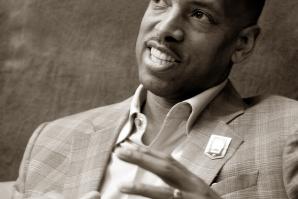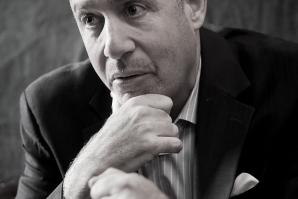When Sacramento Mayor Kevin Johnson appeared before NBA bigwigs last April to plead his case for keeping the Kings, there was a lot more to the pitch than whether investors could afford to buy the team. Just as concerning to David Stern and company was whether California’s notoriously tough environmental laws would keep the deal’s linchpin — a proposed $448 million sports arena — from becoming a reality.
The California Environmental Quality Act, CEQA, has created that same concern for pro-development forces since then-Gov. Ronald Reagan inked it into law in 1970. The Act is intended to force private and public planners to weigh the environmental impacts of development projects before they go forward, and for developers to layout how they will mitigate any of the projects’ negative effects. In short, to give the communities most impacted by development projects a voice in how construction ultimately comes together.
There is no doubt the law has accomplished that goal. But while rightfully hailed as a landmark for environmental protection, critics argue CEQA has also become a job-killing maze of bureaucratic red tape that makes it hard to build even the most environmentally benign projects. Worse, because CEQA-related lawsuits are cheap to bring and can take years to resolve, they have become a sharp-edged tool for just about anyone looking to strangle a development project in its crib.
While environmental groups are certainly in this camp, they are not the only ones. Labor unions and some political interests figured out early on how to use CEQA litigation — or even just the threat of it — to force labor-friendly concessions from builders and local governments.
Rival business interests and activists also use CEQA litigation to slow or kill publicly beneficial commercial and residential proposals they don’t like. The cities of Menlo Park and Atherton, for instance, filed a CEQA lawsuit in 2008 alleging that a planned high-speed rail project would have too severe an impact on their communities. The “impact,” however, was purely aesthetic. After several rejections, the case was finally dismissed for good in February, almost five years after it began.
While that suit failed, many others have not. The list of projects blocked in California is long and varied, from schools and hospitals to infill housing and bike lanes. This has produced howls of protest and calls for reform from pro-business elements, but little to no action. For four decades, CEQA has seemingly been surrounded by an impenetrable wall.
That may finally be changing.
With the recession still fresh in everyone’s mind, Gov. Jerry Brown has made reforming CEQA a focal point of his agenda, at various times calling it “the Lord’s work” and saying he has “never met a CEQA exemption [he] didn’t like.”
In Brown’s perfect world, reform would have come last year when then-Sen. Marco Rubio, a Central Valley Democrat, pitched a plan that would have exempted from CEQA review projects that already complied with most environmental laws. That had heavy support from business interests but went a bit too far for CEQA supporters like Senate President pro Tem Darrell Steinberg, a Sacramento Democrat, who helped give it a quick death.
Rubio was poised to take another run at it this year but then abruptly resigned to take a private sector job with Chevron, offering the ubiquitous, “I want to spend more time with my family” explanation. Only he knows if there was more to it than that, but there is no doubt that pushing the same bill he did last year was going to get him nowhere with Steinberg.
“CEQA was very close to being gutted last year,” Steinberg says. “I stopped it.”
Rubio’s departure seemed to take the wind out of Brown’s sails, prompting the governor to declare CEQA reform likely dead for the year. But while Steinberg was no fan of Rubio’s approach, he was taken aback by Brown’s seeming surrender. He issued a declaration of his own, emphatically insisting that not only was CEQA reform not dead, he was on board to lead the effort to “modernize” the law. Steinberg has also sponsored legislation (Senate Bill 731) that would greatly broaden what constitutes urban infill projects, which already enjoy enhanced protection from CEQA litigation. It would also give local governments more power to decide whether proposed developments meet legal noise and traffic standards, two common CEQA lawsuit themes. And yes, it would make it harder to sue for silly things like aesthetics.
Which brings us back to the Sacramento Kings and the new palace city leaders want to build for them. The guidelines in Steinberg’s bill just happen to fall in line with the proposed arena in downtown Sacramento. Steinberg says he was working on the bill long before the Kings’ situation developed, calling its timing “a happy coincidence.” Perhaps, but it was certainly not coincidental that Steinberg was right at Mayor Johnson’s side during the city’s meetings with the NBA, ostensibly to assure them that CEQA issues would not stop the arena deal from happening.
That said, while Steinberg notes environmental groups, unions and even the California Chamber of Commerce have all voiced their initial approval of his bill, none of it is what anyone would call a slam dunk. As always, CEQA supporters want less reform while pro-business interests want much more. Even so, the bill has cleared one committee and will almost assuredly make it at least to a full Senate debate. Other reform bills have also been proposed, though none as impactful as Steinberg’s.
With Brown now distracted with other issues, it’s clear that Steinberg is going to have to carry the CEQA reform torch this year. But getting a real reform measure to Brown will be tricky. Unlike many previous CEQA reform efforts, Steinberg’s fellow Democrats now solidly control both legislative chambers, and many are not eager to anger their union and environmental supporters. And with Steinberg termed-out in 2014, the usual fervor to keep the boss happy may also be on the wane.
Only time will tell if he can pull it off. After helping to rebuff Seattle’s bid to steal the Kings, reformers can only hope he has at least one more solid shot left in him.
Recommended For You

Mayoral Musings
'Strong Mayor' will make city more nimble, NBA matchmaking and soccer in Sac
It’s been quite a year for Sacramento Mayor Kevin Johnson, topped in most people’s minds by his stunning, come-from-behind effort to block the Maloof family from selling and relocating the Sacramento Kings. We sat down with him recently to discuss basketball and several other topics important to the Capital Region.

Sweet Sorrow
California Senate leader Darrell Steinberg prepares for departure
Darrell Steinberg has been front and center on some of the biggest issues facing the state and our region, from historic land-use reform to mental health care funding.We sat down with him to discuss his current legislative priorities and possible future plans as he enters his final year in the Senate.



